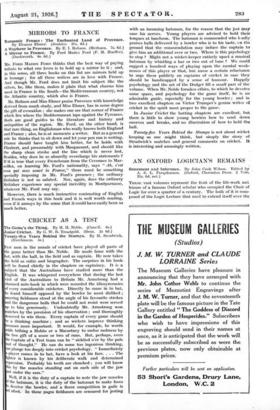CRICKET AS A TEST
wenty-five Years Behind the Stumps. By H. Strudwick.
(Hutchinson. 5s.) - Ew men in the annals of cricket have played all parts of he game better than Mr. Noble. He made fame with the at, with the ball, in the field and as captain. He now takes e field as critic and biographer. The surprises in his book ill be found chiefly in the chapters on captaincy. It is a abject that the Australians have studied more than the. nglish. It was whispered everywhere that during the last isit of the Australians to -Britain Mr. Armstrong had a harmed note-book in which were recorded the idiosyncrasies if every considerable cricketer. Directly he came in to bat, e found himself opposed by the bowler he most disliked ; hnerring fieldsmen stood at the angle of his favourite strokes and the dangerous balls that he could not resist were served UP to him generously. Undoubtedly Mr. Armstrong won Matches by the precision of his observation ; and thoroughly deserved to win them. Every captain of every game should e a thinking machine ; and as wickets improve thinking eeo mes more important. It would, for example, be worth hile bribing a Hobbs or a Macartney to undue rashness by he free gift of a score or two of runs. But, perhaps, even he Captain of a Test team can be " sicklied o'er by the pale east of thought." He can do some too ingenious thinking, IE'an plunge too deeply into cricket psychology. "Immediately player comes in to bat, have a look at his face. . . . The hter is known by his deliberate walk and determined tpression. Probably his teeth are clenched ; you will know !las by the muscles standing out on each side of the jaw last under the ears."
Well, if it is the duty of a captain to note the jaw muscles 4 the batsman, it is the duty of the batsman to make faces deceive the bowler, and a fierce competition in guile is let afoot. In these pages fieldsmen are censured for jesting- esting with with an incoming batsman, for the reason that the jest may ease his nerves. Young players are advised to hold their tongues at luncheon. The batsman is commended who kudly praises balls delivered by a bowler who is to his taste, en the ground that the commendation may induce the captain to give him an additional over or two. Where is this psychology to stop ? Might not a wicket-keeper entirely upset a musical batsman by whistling a bar or two out of tune ? We could suggest a hundred ways of playing upon the mental weak- nesses of this player or that, but nurse a certain reluctance to urge them publicly on captains of cricket in case they should be handicapped by a sense of humour. Happily psychology and the art of the Dodger fill a small part of the volume. When Mr. Noble forsakes ethics, to which he devotes some space, and psychology for the game itself, he is an admirable guide, especially for the young bowler ; and in two excellent chapters on Victor Trumper's genius writes of cricket in the spirit most proper to the game.
In Junior Cricket the batting chapters are excellent, but there is little to show young bowlers how to send down swerves and breaks, and no illustration of how to hold the ball. .
Twenty-live Years Behind the Stumps is not about wicket keeping- as one might think, but simply the story of Strudwick's matches and general comments on cricket. It is interesting and amusingly written.


































 Previous page
Previous page